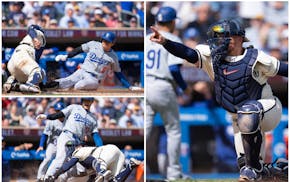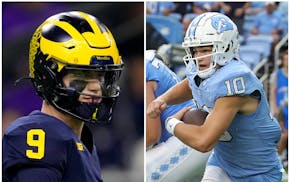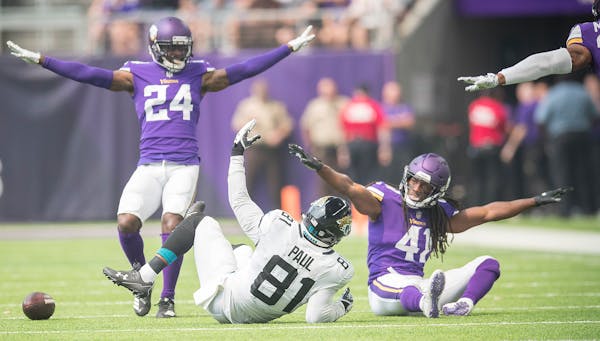In order to make sense of the NFL's rulebook, former Vikings coach Brad Childress thought a test should be used on certain occasions.
Ask 50 drunks in a bar their opinion. The answer is most likely the obvious, and thus correct, call.
Was that a catch? Ask 50 drunks.
That standard would work well for the NFL's new helmet rule being implemented this season. Judging by early interpretation, the changes make a person want to belly-up to the bar, too.
It's going to be a painfully long season if the NFL and its officials insist on flagging what look like textbook tackles.
The new rules are so murky that Vikings coach Mike Zimmer sent a note to the league office asking for clarification on why a Jacksonville defender was called for a penalty in Saturday's game because it looked like a clean, proper-form tackle. Fifty drunks likely would agree.
This is not meant to slam the NFL's intent in trying to make the game safer. The long-term health of players should be paramount in how the league governs the game. Reckless hits in which players show blatant disregard for their opponents or themselves should never be tolerated.
But football is inherently dangerous and there's no way to legislate the physical aspect completely out of the game. It doesn't make someone a Neanderthal to expect football to look like football.
What we saw in preseason games this past weekend stretches credibility with those competing and those watching.
"We're not resistant to these changes," Vikings safety Harrison Smith said. "They just need to be physically possible, I guess."
That drew a laugh from reporters, but he's right. And that's the crux of the problem. The new rule prevents players from lowering their helmet to strike an opponent. Players aren't stationary tackling dummies though. They are moving at warp speed, and their target is constantly changing. Even tackles that look normal are being flagged.
Officials face an impossible task of trying to discern technique in that split second.
"I think when they are the egregious, the head down, the linear posture, yes, I get it with those," Smith said. "There are other ones that I think from a rational standpoint, they don't make sense. I think those need to continue to be worked on. Otherwise, it is going to be almost every play."
The league distributed an instructional video and had officials meet with teams to outline what constitutes legal hits. Even that was confusing, Smith said, because some of the tackles looked textbook.
"It was almost like they put every type of tackle on there to cover all the bases," Smith said. "I think that is where it's at right now, to be honest."
Hopefully this is merely a case of NFL officials acting like a stern teacher on the first day of school. Make a point in the preseason by over-officiating and then become less vigilant or nitpicky once the regular starts.
Continuing down this path will only invite more anger and controversy. Fan patience will disappear quickly if games become an endless stream of flags, especially if penalties are called on what look like routine tackles.
And, worse, wait until the new rule results in a critical penalty that decides a game's outcome.
"It's going to cost some people some jobs," Zimmer said. "Playoffs, jobs, the whole bit, I'm guessing."
Said Smith: "I don't fear it. It is going to happen. It is going to change games."
The league can't pretend this isn't a problem. Some have suggested a replay tweak that allows coaches to challenge lowering-the-helmet penalties. Replay stoppages tend to serve as mood killers, but if it prevents officiating mistakes that could alter a game or leave you cursing in anger, maybe it's worth exploring.
A violent sport is less violent now thanks to medical research and greater acknowledgment and adherence to rules designed to protect players. The league should have zero tolerance for dangerous plays. Hits that drew personal foul penalties in the Vikings game fell into a different category.
They didn't look dangerous or dirty. Instead, they looked like normal, routine football tackles.
Chip Scoggins • chip.scoggins@startribune.com
Scoggins: 'Wait one more year' can't be the Wild's plan. Thankfully, it isn't.

Scoggins: Finch feeling heat of the Suns as playoff battle looms
Scoggins: Why 'championship or bust' fits these Wolves

Scoggins: Anatomy of a game-saving play as Correa throws out Ohtani


